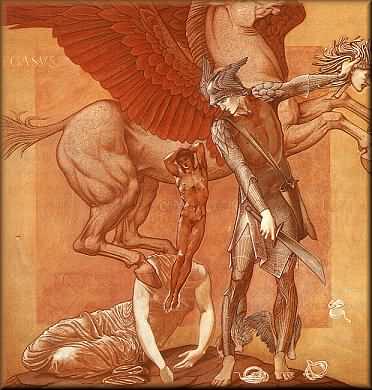|
PERSEUS
As told by the authors Ovid and Hesiod King Acrisius of Argos had only one child, a daughter named DanaŽ. She was beautiful above all the other women of the land, but the King was not content because he wanted to have a son. Journeying to the Oracle of Delphi, he was told by the priestess that he would never be the father of a boy, and even worse, his daughter would have a son who would kill him. In an attempt to escape his fate, he tried to ensure that DanaŽ would not have any children. He shut and guarded her in a house built of bronze and sunk underground. He hoped that in this way, he would not have to kill her and thus would spare his own life. One day, Zeus visited her as a shower of gold and she bore his son. For a time, she tried to conceal the child from her father, but the narrow limits of the bronze house made it increasingly difficult and soon Perseus was discovered by his grandfather. Acrisius was very angry but was afraid to kill the boy or his mother because he feared Zeus. He had a great chest made, placed the two in it, and brought it to the sea and cast it into the water. The chest was tossed out to sea and finally one day, they landed on an island but they had no way to get out of the box. Fate willed it, or even Zeus, that they were discovered by a good fisherman, name Dictys. He came upon the box, broke it open and took them home to his wife who was as kind as he. The two lived there for many years, DanaŽ being content to let her son follow the fisherman's humble trade. But in the end more trouble came. Polydectes, the ruler of the small island (and Dictys' brother) fell in love with her. He wanted her, but not her son (who was now fully grown), and he set himself to think of a way of getting rid of him. There existed some fearsome monsters called Gorgons who lived on an island and were known far and wide because of their deadly power. Polydectes talked to Perseus and told him that there was nothing that he rather have than one of their heads. He announced that he was to be married and called his friends to the celebration, including Perseus. Each guest, as a custom, brought the bride-to-be a gift, except for Perseus. Mortified, he then stood up and declared that he would go off and kill Medusa (which was one of the Gorgons) and bring back her head as his gift. This was exactly what the king had planned. There were three Gorgons and whoever looked at them was turned instantly to stone. Polydected fully expected Perseus never to return alive. Not daring to see his mother, he sailed off to Greece to learn where the monsters were to be found. He went to Delphi, but all the priestess could tell him was that the men should not eat Demeter's golden grain but only acorn. He then traveled to Dodona where the Selli lived and made their bread from acorns. They too did not know where the Gorgons lived. When and how Hermes and Athena came to his help was not known but he must have known despair before they did so. At last, however, as he wandered, he met a strange and beautiful person - none other than Hermes, the messenger god and the guide for the giver of good. This radiant person told him that before he attacked Medusa, he must first be properly equipped, and that what he needed was in the possession of the nymphs of the North. To find the nymph's abode, they must go to the land of the Grey Women (Graea) where all was dim and shrouded in twilight. These three women were all grey and withered as in extreme age. They had but one eye for the three, which they would take turns with, each removing it from her forehead after she had used it for a time and then handing it to another. Hermes unfolded the plan. He would lead Perseus to them and when they arrived, he would remain hidden until one of them took their eye out of their forehead to pass it on. At that moment, he would rush forward and seize the eye and refuse to give it back until they told him how to reach the nymphs of the North. Hermes gave Perseus a sword to attack Medusa, which could not be bent or broken by the Gorgon's scales. This was a wonderful gift, but what use was a sword if the creature to be struck by it could turn it into stone before he was within striking distance? The goddess Athena stood beside Perseus and she took off her shield of polished bronze and gave it to him. She told him he would be able to see Medusa in it as in a mirror, and so avoid her deadly power. When they found the Grey Women, Perseus carried out Hermes' plan and was successful in learning where the nymphs of the North lived. And so he now was bound for the country of the Hyperboreans. No one had been able to reach the place of the Hyperboreans but since Hermes was with him, the road laid open to Perseus. There he found a host full of people always banqueting and holding joyful revelry, who welcomed him kindly. They gave him three things: winged sandals, a cap which made the wearer invisible, and a magic wallet which would always become right size for whatever was to be carried in it. Now, Perseus was ready for the Gorgons and Hermes knew where they lived. So the two flew back across the ocean and over the sea to the Terrible Sisters' island. Luckily they were asleep when Perseus found them. In the mirror of the shield, he saw the creature with great wings and bodies covered with golden scales and hair a mass of twisting snakes. Athena and Hermes pointed out which one was Medusa because the other two were immortal. With a single sweep of the sword, he cut her neck and his eyes were fixed on the shield with never a glance at her, he swooped low enough to seize her head. He dropped it into the wallet, which closed around it. The other two Gorgons woke up horrified at the sight of their slain sister, they tried to pursue the slayer, but Perseus had on the cap of darkness and they could not see him. After the slaughter of Medusa, Perseus, bearing with him the head of the Gorgon, flew far and wide, over land and sea. As night came on, he reached the western limit of the earth, where the sun goes down. Here he would gladly have rested till morning. It was the realm of King Atlas, whose bulk surpassed that of all other men. He was rich in flocks and herds and had no neighbour or rival to dispute his state. But his chief pride was in his gardens whose fruit was of gold, hanging from golden branches, half hid with golden leaves. Perseus said to him, "I come as a guest. If you honour illustrious descent, I claim Jupiter for my father; if mighty deeds, I plead the conquest of the Gorgon. I seek rest and food." But Atlas remembered that an ancient prophecy had warned him that a son of Jove should one day rob him of His golden apples. So he answered, "Begone! or neither your false claims of glory nor parentage shall protect you;" and he attempted to thrust him out. Perseus, finding the giant too strong for him, said, "Since you value my friendship so little, deign to accept a present;" and turning his face away, he held up the Gorgon's head. Atlas, with all his bulk, was changed into stone. His beard and hair became forests, his arms and shoulders cliffs, his head a summit, and his bones rocks. Each part increased in bulk till be became a mountain, and (such was the pleasure of the gods) heaven with all its stars rests upon his shoulders. On his way back, he came to Ethiopia and found that a lovely woman was about to be devoured by a horrible sea serpent. Her name was Andromeda. When Perseus arrived, the maiden was on a rocky ledge by the sea, chained there to wait for the coming of the monster. Perseus found her and instantly fell in love with her. He waited beside her and when the great snake came for its prey, he cut off its head. Perseus took Andromeda to her parents and asked for her hand in marriage, which they gladly gave him. When he returned to the island where he was raised, he found no one. The fisherman's wife had died long ago and Dictys and DanaŽ had fled from the furious Polydectes when she refused to marry him. They had taken refuge in the temple. The king was having a banquet at the palace, and Perseus seized the opportunity. He walked into the palace and took out the head of Medusa and all the guests and the King were turned into stone. When the islanders knew that they had been freed from the tyrant, Perseus found DanaŽ and Dictys. He made Dictys king of the island and he and his mother returned with Andromeda to Greece to reconcile with Acrisius. When they reached Argos, they discovered that Acrisius had been driven away. Perseus heard that the King of Larissa was holding a great athletic banquet and he journeyed to take part. In the discus-throwing competition when his turn came and he hurled the heavy missile, it swerved and fell among the spectators. Acrisius was there on visit and the discus struck him and he died at once. Through this act, Apollo's oracle at Delphi proved to be true. Perseus and Andromeda lived happily ever after. Their son was Electryon, who was the grandfather of Hercules. Medusa's head was given to Athena, who bore it always upon the aegis, Zeus' mighty shield, which she carried for him. A whole bunch of Perseus info in point form Prophecy and Birth. Getting rid of
uncomfortable person. The quest. The death of Medusa. Andromeda released. Perseus came back to
Seriphus only to discover that Polydectes behaved like a cruel ruler.
And once again, remembering his weapon, he entered the palace and showed
the king and his friends the head of Medusa, and all who saw it were
instantly turned into stone. After this he gave all objects he had
borrowed to their respective owners, and the head he gave to Athena, who
inserted it in her shield. That is why some say that Medusa was beheaded
for Athena's sake, because Medusa used to match herself with Athena in
beauty. Prophecy fulfilled. Some say, however, that Acrisius was obssessed with the oracle and that when he discovered that Perseus and Danae were staying at Polydectes's court, he went to get them, but at his arrival Polydectes interceded for them, and Perseus was made to swear that he would never kill his grandfather. Acrisius, however, had to stay there because of a storm, and in the meanwhile Polydectes died. And they say that it was at his funeral games that the wind blew a discus from Perseus's hand at Acrisius' head killing him. They also say that, after this, Perseus went to Argos and took possession of Acrisius' kingdom. Exchange of kingdoms
and foundation of Mycenae. Death and
immortality. For more on Medusa, click here
|

